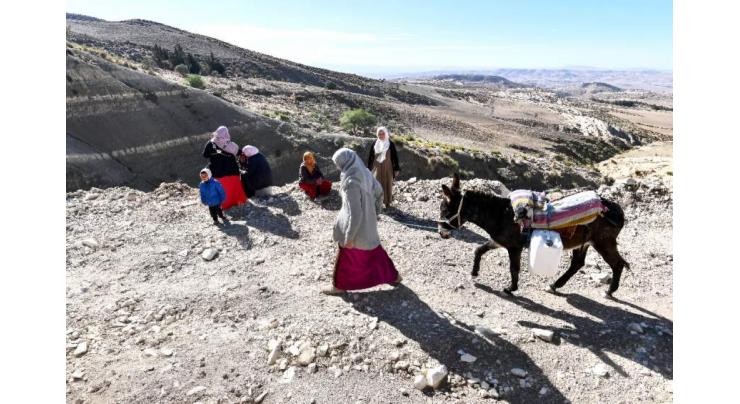
'Living Dead': Tunisian Villages Suffer Drought, Climate Change
Sumaira FH Published December 06, 2023 | 07:58 PM

Tunisian villager Ounissa Mazhoud ties two empty jerry cans to a donkey and cautiously descends a stony hill towards the last local source of water
Ouled Omar, (APP - UrduPoint / Pakistan Point News - 6th Dec, 2023) Tunisian villager Ounissa Mazhoud ties two empty jerry cans to a donkey and cautiously descends a stony hill towards the last local source of water.
The North African country, in its fourth year of drought, is grappling with its worst water scarcity in years.
Mazhoud -- like other women in the remote village of Ouled Omar, 180 kilometres (110 miles) southwest of the capital Tunis -- wakes up every morning with one thing on her mind: finding water.
"We are the living dead ... forgotten by everyone," said Mazhoud, 57, whose region was once one of Tunisia's most fertile, known for its wheat fields and Aleppo pines.
"We have no roads, no water, no aid, no decent housing, and we own nothing," she said, adding that the closest source of water is a river about an hour's arduous walk away.
Providing water for their families, she said, means that "our backs, heads and knees hurt, because we labour from dawn to dusk".
The World Bank predicts that by 2030 the Middle East and North Africa region will fall below the "absolute water scarcity" threshold of 500 cubic metres yearly per person.
Tunisia, already the 33rd most water-stressed country according to the World Resources Institute, has dropped to 450 cubic metres per inhabitant.
Its dams -- the primary source for drinking water and irrigating crops -- are filled at just 22 percent capacity, despite brief showers recently, according to official figures.
Some 20 dams have already gone out of service, mostly in the most arid south.
Last spring, Tunisian authorities introduced water rationing to limit household use even in major cities.
But in remote villages, where water scarcity impacts crucial farming and livestock, the issue takes on even greater weight.
Ramzi Sebtaoui, a stockbreeder in his thirties, brings water to his family every day by driving to the closest source, some 20 kilometres away in the city of Maktar.
"Two or three years ago, the situation was much better, with many natural sources of water that we could use for livestock," he said.
"Today, due to climate change and other factors, almost all sources have dried up, and the roads are destroyed."
Last week, Ouled Omar residents travelled almost 50 kilometres to the city of Siliana to protest outside governorate offices, demanding a paved road and access to clean water.
"They don't have a source of drinking water, not even taps," Houda Mazhoud, a researcher who has been advocating for Ouled Omar's access to clean water for years, told AFP.
"As a result, they use a natural source. But with climate change, it's starting to disappear."
Related Topics
Recent Stories

Pakistan confirm South Africa tour details

Ranbir Kapoor showers praise on beauty of Mahira Khan

ICube Qamar: Pakistan successfully launches first lunar mission

Deputy PM Dar calls for OIC's joint action to confront rising Islamophobia

Bus Plunge in Chilas Claims 20 Lives

Pakistan to launch first lunar orbit mission 'ICUBE-Qamar' today

Currency Rate In Pakistan - Dollar, Euro, Pound, Riyal Rates On 3 May 2024

Today Gold Rate in Pakistan 03 May 2024

Dar for joint action to counter Islamophobia in context of Israeli aggression ag ..

Azam Tarar urges for effective implementation of Action Plan for Human Rights

PAF cadets' graduation ceremony held

One-day national seminar "Great Power Competition: Challenges and Opportunities ..
More Stories From World
-
Japan town begins blocking Mt Fuji view from 'bad-mannered' tourists
18 minutes ago -
China launches first probe to collect samples from far side of Moon
28 minutes ago -
Sir Run Run Hospital affiliated with Zhejiang University School of Medicine celebrates 30th annivers ..
48 minutes ago -
El Kaabi hits three as Olympiakos shock Aston Villa, Fiorentina edge Brugge
1 hour ago -
Hong Kong's Hang Seng Index closes 1.48 pct higher
1 hour ago -
China box office daily report
1 hour ago
-
China launches special campaign concerning summer marine fishing ban
1 hour ago -
Singapore's FDI up 10 pct in 2023
1 hour ago -
UK's Labour calls for general election after strong early showing in local polls
1 hour ago -
Seoul spy agency warns N. Korea plotting attacks on embassies
1 hour ago -
El Kaabi hits three as Olympiakos shock Aston Villa, Fiorentina edge Brugge
1 hour ago -
Singapore's FDI up 10 pct in 2023
1 hour ago